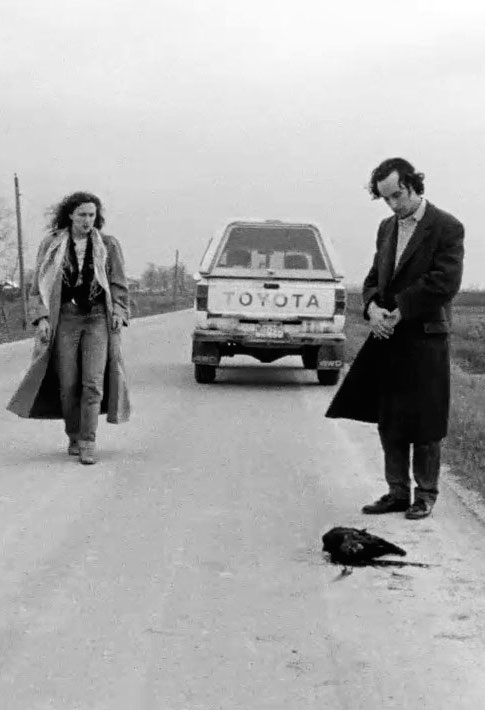Friday, April 27, 1990
ROADKILL. Written by Don McKellar. Music by Nash the Slash. Co-produced and directed by Bruce McDonald. Running time: 85 minutes. Mature entertainment with the B.C. Classifier’s warning: some very coarse language, occasional violence.
THE CHILDREN OF PARADISE are missing.
Dispatched to the great, grey North after them is Ramona (Valerie Buhagiar), girl Friday to the itinerant bar band's Toronto-based promoter.
In a highway coffee shop, she learns the CoP are off the road because their lead singer "cut out four days ago."
"What's he looking for?" she asks, ingenuously.
"Spiritual transcendence," says Frog (Dean Richards), the band’s bass player.
"Spiritual transcendence?" Ramona repeats. "That's a pretty unpredictable thing."
Roadkill, Toronto independent filmmaker Bruce McDonald's award-winning first feature, is a black-and-white throwback to the self-indulgent youth films of the 1960s.
Calling itself "a rock 'n' road movie about a girl who learns to drive," it takes us down the blacktop again in a futile search for unpredictable things, such as an artful bit of wit or, perhaps, a flash of originality.
According to Don McKellar's episodic screenplay, non-driving Ramona is stranded in Sudbury. Since this is self-proclaimed "outlaw cinema," I hoped for something more than a series of sarcastic skits on what it means to be a Canadian.
And what does it mean?
To Bruce Shack (played by director McDonald), it means frustrated ambition. In charge of a camera crew sent to do a CoP concert documentary, he offers Ramona a part in the impressionistic feature he's shooting on the side.
"I don't want to make any more videos," he says. "I want to make a movie about real life."
To Russell Skelly (writer Don McKellar), the problem is limited options. A would-be serial killer, he notes that in small-town Canada "you can either become a hockey player or take up a life of crime.
"I have weak ankles," he says, "so there you are."
Ramona's own salary cheques come from a federally funded job-placement program. Her boss, slimy, profane entrepreneur Roy Seth (Gerry Quigley) knows that success in Canada is often purchased with other people's money.
Director McDonald knows that story.
Having established his credentials as an editor working for such subsidy culture wunderkinds as Ron (Comic Book Confidential) Mann, Peter (The Top of His Head) Mettler and Atom (Speaking Parts) Egoyan, McDonald hit up the Canada Council, the Ontario Arts Council and the Ontario Film Development Corporation for the "loot, clams and booty" to make Roadkill.
Based on their support, we can conclude that he writes a great grant application. His talents as a commercial filmmaker are less obvious.
Perhaps we all would have been better off if McDonald had emulated Matthew (Shaun Bowring), the missing rock singer, rather than Seth. Matthew has sworn a vow of silence.
"Nothing left to say," he says in a note to Ramona.
In common with its absentee hero, Roadkill is a film with hardly anything to say.
The above is a restored version of a Province review by Michael Walsh originally published in 1990. For additional information on this archived material, please visit my FAQ.
Afterword: On the whole, Bruce McDonald has been a force for good in the English Canadian film community. Although I wasn’t thrilled with his first two features — Roadkill and 1991’s Highway 61 — I found a lot to like about Dance Me Outside, his 1994 adaptation of W.P. Kinsella’s incisive short stories about life on a First Nation reservation. It didn’t help that Roadkill arrived in Vancouver with an ad campaign that emphasized its selection as Best Canadian Feature at 1989’s Toronto International Film Festival. After two decades covering the arts and entertainment scene on Canada’s left coast, I’d developed a considerable regional bias. I was less than impressed with Ontario’s self-importance, and found myself reacting negatively to Central Canadian city boys who insisted on wearing cowboy hats.
Along with directorial contemporaries Atom Egoyan, Ron Mann, Don McKellar and Patricia Rozema, McDonald was part of something that would come to be promoted as the “Toronto New Wave.” Like its name, just about everything about this cinematic movement was derivative. At the time, Ontario was doing what it could to wrest attention away from the robust creative centres of Quebec and B.C. In 1986, it created the Ontario Film Development Corporation to throw money at its filmmakers. In 1988, McDonald guest edited an “Outlaw Edition” of Cinema Canada magazine that focused on the generational rebels determined to change the face of the movies. Hard Core Logo, McDonald’s most honoured film (six Genie Award nominations and one win), was released in 1996, the year that a new Conservative government in Ontario shut down its OFDC. According to the cultural historians, that also was the year that the Toronto New Wave came to “an abrupt halt.” McDonald, whose own talent was not in question, made a seamless transition to television series and feature direction. There he has pursued a successful career to this day (May 28), which happens to be his 61st birthday.
